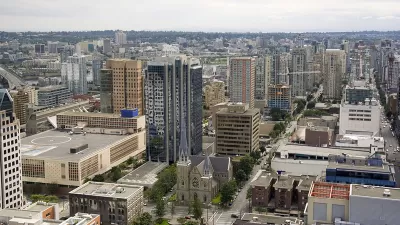UBC's Patrick Condon argues that for Vancouver and cities like it, simply adding supply at any level doesn't get at the root causes of the global affordable housing crisis.

The Planning Report interviews Patrick Condon, chair of Urban Design at the University of British Columbia, about the factors that led Vancouver to launch its recent housing policy "reset"—a shift away from encouraging all types of housing to investing in the preservation of affordable housing. At first, Condon says, the city facilitated plenty of development "based on the assumption that any supply is good supply" because even high-end housing would improve affordability. But over time:
It became increasingly obvious that adding supply in this way was not reducing, but actually increasing, the cost of housing. Adding supply at the high end had the nefarious consequence of increasing the apparent investment value of real estate throughout the entire city. It not only created supply that was unaffordable to the people who live here, but also had the perverse effect of raising the cost of all housing throughout the city.
Now, the city is pursuing a set of strategies whose goal is to devalue land—"because in reality, we don’t have a high-cost housing problem. We have a high-cost buildable land problem," Condon says. The new 10-year plan also encourages transit-oriented development, streamlines development permits, and preserves existing affordable housing, while targeting investment in new supply to housing for average incomes.
For Condon, these are first steps that can help alleviate the stress caused by a deeper, more pervasive problem: a global real estate environment that has rendered housing a commodity. "The fundamental problem is that there is a flow of money away from the middle class toward the investor class, and that is not a problem that purely housing-oriented strategies are going to solve," he says.
Condon is the first to note that his research has met a cooler reception in Vancouver than in neighboring cities. Planetizen blogger Michael Llewyn has offered contrasting perspectives on the roots of Vancouver's housing problem and possible solutions.
FULL STORY: Learning from Vancouver: Housing Affordability & the Myth of Supply-Side Densification

Maui's Vacation Rental Debate Turns Ugly
Verbal attacks, misinformation campaigns and fistfights plague a high-stakes debate to convert thousands of vacation rentals into long-term housing.

Planetizen Federal Action Tracker
A weekly monitor of how Trump’s orders and actions are impacting planners and planning in America.

San Francisco Suspends Traffic Calming Amidst Record Deaths
Citing “a challenging fiscal landscape,” the city will cease the program on the heels of 42 traffic deaths, including 24 pedestrians.

Defunct Pittsburgh Power Plant to Become Residential Tower
A decommissioned steam heat plant will be redeveloped into almost 100 affordable housing units.

Trump Prompts Restructuring of Transportation Research Board in “Unprecedented Overreach”
The TRB has eliminated more than half of its committees including those focused on climate, equity, and cities.

Amtrak Rolls Out New Orleans to Alabama “Mardi Gras” Train
The new service will operate morning and evening departures between Mobile and New Orleans.
Urban Design for Planners 1: Software Tools
This six-course series explores essential urban design concepts using open source software and equips planners with the tools they need to participate fully in the urban design process.
Planning for Universal Design
Learn the tools for implementing Universal Design in planning regulations.
Heyer Gruel & Associates PA
JM Goldson LLC
Custer County Colorado
City of Camden Redevelopment Agency
City of Astoria
Transportation Research & Education Center (TREC) at Portland State University
Jefferson Parish Government
Camden Redevelopment Agency
City of Claremont





























